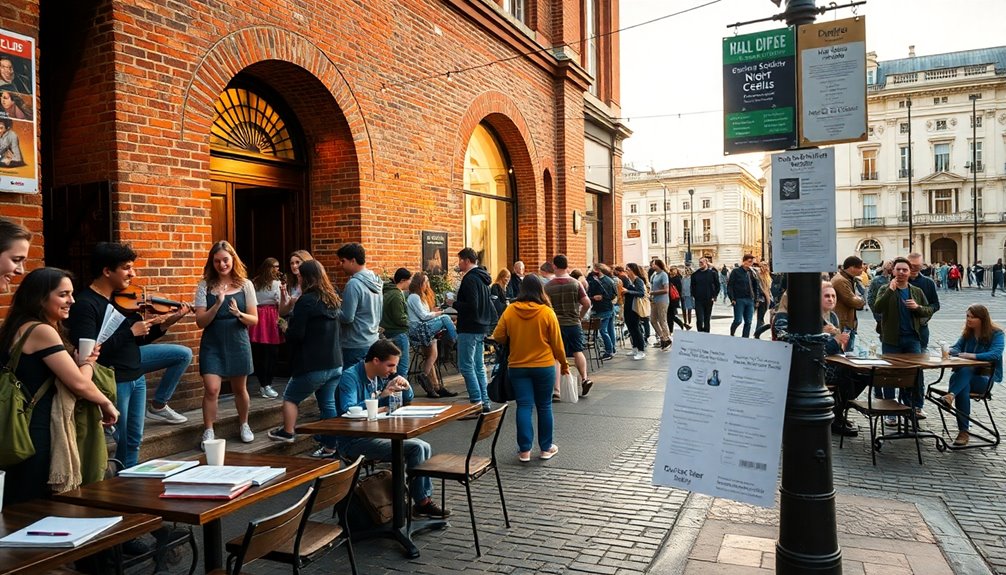
Chasing Dreams: Study Packages in Dublin helps you choose courses, neighbourhoods and budgets so you can study smartly. You’ll compare central bustle versus quieter suburbs, leases, deposits and utility costs to pick the best fit. Transport tips cover Leap cards, Luas, DART and cycling for faster, cheaper commutes. Academic guidance highlights course fit, study spaces and support services. Practical advice on groceries, healthcare, banking and student clubs keeps daily life simple — keep going to learn specifics and next steps.
Highlights
- Compare packaged study programs by course fit, duration, and accreditation to match career goals and visa requirements.
- Factor total living cost into packages: rent, gas, electricity, internet, groceries, and transport (Leap card savings).
- Choose accommodations near campus or transport links to reduce commute time and winter heating costs.
- Prioritize packages offering academic support, career services, and access to libraries or 24/7 study spaces.
- Look for flexibility, student discounts, and clear lease/utility responsibilities before committing.
Living in Dublin: Neighborhoods, Rent and Utilities
Wondering which Dublin neighborhood will fit your lifestyle and budget? You’ll weigh neighborhood diversity against cost: central areas offer nightlife and shorter commutes, suburbs give space and lower rent. Compare rental agreements carefully—duration, deposit, and utility responsibilities vary—so you won’t be surprised by bills. Calculate average rent, add gas, electricity, internet, and waste charges to see true monthly cost. Seek flexible leases if you value freedom, and check tenant rights. Inspect heating and insulation; utilities spike in winter. Prioritize what matters—proximity, price, or calm—and choose a neighborhood that matches your study-life balance.
Transport, Commuting Tips and Student Discounts
Because Dublin’s transport network mixes buses, trams (Luas), suburban rail (DART and commuter trains) and an expanding cycle infrastructure, you’ll want to plan commutes based on cost, time, and reliability rather than just distance. You’ll compare public transport routes, frequency, and peak crowding; use the Leap card to cut fares across modes; and check real-time apps for delays. Embrace cycling options for short to medium trips—bike lanes and rental schemes save money and give freedom. For students, look for university and retailer discounts, annual or semester passes, and off-peak travel to balance budget with flexible, efficient movement.
Academic Life: Universities, Courses and Study Spaces
When you pick a university in Dublin, consider not just its course rankings but how its programmes, assessment methods and support services align with your learning style and career goals. You’ll want clear course selection guidance, flexible modules and transparent assessment so you can design a path that suits ambition and lifestyle. Inspect study spaces: libraries, quiet rooms, collaborative hubs and 24/7 zones affect productivity. Evaluate academic support—tutoring, career centres, mental-health services and peer networks—to guarantee resilience. Visit campuses, audit sample lectures and talk to current students. That way you’ll choose an environment that maximises autonomy and academic progress.
Daily Essentials: Groceries, Healthcare and Banking
After you’ve sized up academic life, you’ll want practical routines sorted so study doesn’t get derailed by everyday tasks. You’ll map local grocery shopping spots—markets, supermarkets and budget chains—for fresh produce and essential supplies, balancing cost and convenience. Compare healthcare options: GP registration, student clinics and emergency services, plus insurance or public coverage details so you’re prepared. Set up banking services early: choose accounts with low fees, mobile banking and international transfer ease to manage rent and allowances. Plan weekly budgets, streamline errands, and automate payments so you keep independence and focus while living and studying in Dublin.
Social Life: Clubs, Student Events and Local Culture

If you want to build a balanced social life in Dublin, start by mapping the options that match your interests and schedule: university clubs and societies, campus events, student unions’ activities, local pubs with quiz and music nights, and community cultural centres. You’ll join student organizations to meet peers, develop skills and access low-cost events. Prioritize a mix: academic clubs, sports, arts and occasional nightlife activities so your energy and budget stay sustainable. Evaluate event calendars, commit to one or two groups, and stay open to spontaneous cultural outings. That way you’ll enjoy freedom without overcommitting or isolating yourself.
Some Questions Answered
How Do I Open a Part-Time Business as an International Student?
You can open a part-time business by researching viable business ideas, checking visa work limits, and meeting local legal requirements like registration, taxes, and permits. You’ll analyze demand, costs, and time management to balance studies. Use university resources, mentors, and co-working networks to refine a lean plan. Stay compliant with immigration rules and keep records to protect your freedom to scale or pivot when opportunities arise.
What Visa Rules Apply for Internships After Graduation?
After graduation you’re usually eligible for a post-study work visa allowing internships if you meet Visa eligibility criteria like degree level, immigration status, and application timing. Internship duration depends on the specific visa: some permit up to 12–24 months, others match your visa length. You’ll need to analyze job type, employer sponsorship rules and work-hour limits. Plan timing, gather documents, and consider shifting from internship to sponsored employment for longer stays.
Can I Bring My Pet to Student Accommodation in Dublin?
Yes — usually you can’t bring pets to most student halls, though exceptions exist, especially for service animals. Like a Victorian telegram, you should check pet policies before signing. Compare accommodation options: private student houses, rented flats, or uni-managed halls — private lets often offer more flexibility. Ask landlords for written permission, clarify deposits and cleaning rules, and consider local bylaws; be ready to compromise for freedom and welfare.
Where Can I Find Short-Term Storage for Belongings During Summer?
You can use local storage facilities and short-term summer rentals to stash belongings; many offer flexible, month-to-month options. Compare prices, security features, access hours and insurance; check student discounts and proximity to transport. Look at national chains, independent lockers near universities, and peer-to-peer storage apps for cheaper choices. Book early during peak season, read reviews, and reserve a unit sized for items you won’t need while you’re free to travel or intern.
Are There Scholarships for International Students From Specific Countries?
Yes — you’ll find scholarship opportunities targeted to students from specific countries. Search university websites, government programs, and international organizations for country specific grants, compare eligibility and deadlines, and weigh coverage (tuition, living costs, travel). Apply broadly and tailor each application to criteria and cultural context. Being strategic and persistent increases your chances of securing funding that aligns with your goals and preserves your freedom to study abroad.
Summing Everything Up
You’ve seen how Dublin’s student life balances costs, commute choices, academic opportunities and social scenes — now picture the city as a venn diagram where neighborhoods, universities and budgets overlap. Test the theory that smarter planning enlarges your options: map rent vs. commute vs. campus amenities, then adjust priorities to find the sweet spot. With data-driven choices and local insight, you’ll maximize study time, cut stress and enjoy more of Dublin’s culture without breaking the bank.
